英语学习计划用英语怎么说
英语学习计划怎么说
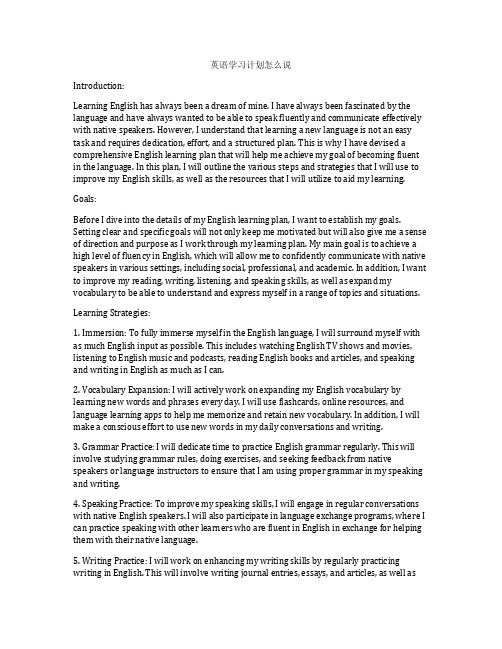
英语学习计划怎么说Introduction:Learning English has always been a dream of mine. I have always been fascinated by the language and have always wanted to be able to speak fluently and communicate effectively with native speakers. However, I understand that learning a new language is not an easy task and requires dedication, effort, and a structured plan. This is why I have devised a comprehensive English learning plan that will help me achieve my goal of becoming fluent in the language. In this plan, I will outline the various steps and strategies that I will use to improve my English skills, as well as the resources that I will utilize to aid my learning.Goals:Before I dive into the details of my English learning plan, I want to establish my goals. Setting clear and specific goals will not only keep me motivated but will also give me a sense of direction and purpose as I work through my learning plan. My main goal is to achieve a high level of fluency in English, which will allow me to confidently communicate with native speakers in various settings, including social, professional, and academic. In addition, I want to improve my reading, writing, listening, and speaking skills, as well as expand my vocabulary to be able to understand and express myself in a range of topics and situations. Learning Strategies:1. Immersion: To fully immerse myself in the English language, I will surround myself with as much English input as possible. This includes watching English TV shows and movies, listening to English music and podcasts, reading English books and articles, and speaking and writing in English as much as I can.2. Vocabulary Expansion: I will actively work on expanding my English vocabulary by learning new words and phrases every day. I will use flashcards, online resources, and language learning apps to help me memorize and retain new vocabulary. In addition, I will make a conscious effort to use new words in my daily conversations and writing.3. Grammar Practice: I will dedicate time to practice English grammar regularly. This will involve studying grammar rules, doing exercises, and seeking feedback from native speakers or language instructors to ensure that I am using proper grammar in my speaking and writing.4. Speaking Practice: To improve my speaking skills, I will engage in regular conversations with native English speakers. I will also participate in language exchange programs, where I can practice speaking with other learners who are fluent in English in exchange for helping them with their native language.5. Writing Practice: I will work on enhancing my writing skills by regularly practicing writing in English. This will involve writing journal entries, essays, and articles, as well asseeking feedback from language tutors or online writing communities to improve the quality of my writing.Resources:1. Language Learning Apps: I will use language learning apps, such as Duolingo, Babbel, and Rosetta Stone, to help me learn and practice English. These apps offer interactive lessons, quizzes, and activities that can effectively improve my language skills.2. Online Courses: I will enroll in online English courses offered by reputable language learning platforms, such as Coursera or Udemy. These courses will provide me with structured lessons, practice exercises, and access to language instructors that can help me improve my language skills.3. Reading Material: I will read a variety of English books, newspapers, articles, and blogs to expose myself to different writing styles and vocabulary. This will help me improve my reading comprehension and expand my knowledge of the language.4. Language Exchange: I will join language exchange programs or online communities where I can connect with native English speakers who are interested in learning my native language. This will provide me with opportunities to practice speaking with fluent English speakers and receive feedback on my language skills.5. Language Tutors: I will seek the guidance of a language tutor or instructor who can provide me with personalized feedback and support in my English learning journey. This will help me address any weaknesses or areas of improvement in my language skills.Weekly Schedule:Monday:- Vocabulary Expansion: Learn 20 new words and use them in sentences.- Reading Practice: Read a chapter of an English book or an article.Tuesday:- Grammar Practice: Complete grammar exercises and review grammar rules.- Speaking Practice: Practice speaking with a language partner or tutor.Wednesday:- Writing Practice: Write a short essay or journal entry in English.- Language Learning App: Complete a lesson on a language learning app.Thursday:- Vocabulary Expansion: Learn 20 new words and use them in sentences.- Listening Practice: Listen to English podcasts or watch English videos.Friday:- Grammar Practice: Complete grammar exercises and review grammar rules.- Speaking Practice: Participate in a language exchange session.Saturday:- Reading Practice: Read a variety of English materials, including newspapers and blogs.- Language Learning App: Complete a lesson on a language learning app.Sunday:- Review: Review the vocabulary, grammar, and lessons from the past week.- Speaking Practice: Join a language exchange session or practice speaking with native speakers.Conclusion:I am confident that by following this comprehensive English learning plan and incorporating the outlined strategies and resources, I will be able to make significant progress in improving my English skills. With dedication and consistent practice, I believe that I will achieve my goal of fluency in English and will be able to confidently communicate in the language. I am excited to embark on this journey and look forward to the growth and learning experiences that lie ahead.。
制定学习英语的计划英文
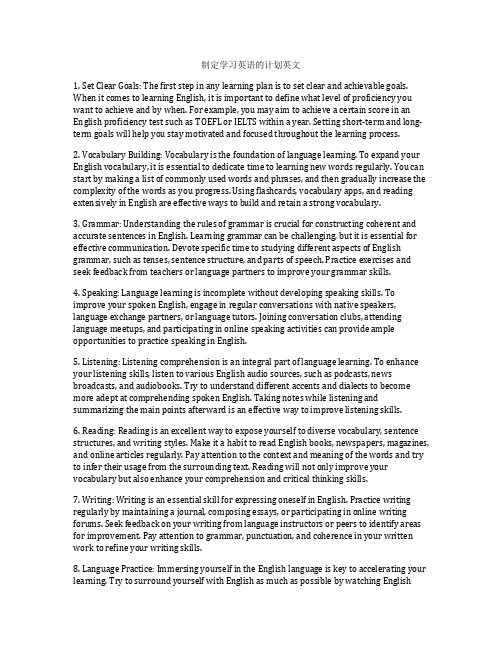
制定学习英语的计划英文1. Set Clear Goals: The first step in any learning plan is to set clear and achievable goals. When it comes to learning English, it is important to define what level of proficiency you want to achieve and by when. For example, you may aim to achieve a certain score in an English proficiency test such as TOEFL or IELTS within a year. Setting short-term and long-term goals will help you stay motivated and focused throughout the learning process.2. Vocabulary Building: Vocabulary is the foundation of language learning. To expand your English vocabulary, it is essential to dedicate time to learning new words regularly. You can start by making a list of commonly used words and phrases, and then gradually increase the complexity of the words as you progress. Using flashcards, vocabulary apps, and reading extensively in English are effective ways to build and retain a strong vocabulary.3. Grammar: Understanding the rules of grammar is crucial for constructing coherent and accurate sentences in English. Learning grammar can be challenging, but it is essential for effective communication. Devote specific time to studying different aspects of English grammar, such as tenses, sentence structure, and parts of speech. Practice exercises and seek feedback from teachers or language partners to improve your grammar skills.4. Speaking: Language learning is incomplete without developing speaking skills. To improve your spoken English, engage in regular conversations with native speakers, language exchange partners, or language tutors. Joining conversation clubs, attending language meetups, and participating in online speaking activities can provide ample opportunities to practice speaking in English.5. Listening: Listening comprehension is an integral part of language learning. To enhance your listening skills, listen to various English audio sources, such as podcasts, news broadcasts, and audiobooks. Try to understand different accents and dialects to become more adept at comprehending spoken English. Taking notes while listening and summarizing the main points afterward is an effective way to improve listening skills.6. Reading: Reading is an excellent way to expose yourself to diverse vocabulary, sentence structures, and writing styles. Make it a habit to read English books, newspapers, magazines, and online articles regularly. Pay attention to the context and meaning of the words and try to infer their usage from the surrounding text. Reading will not only improve your vocabulary but also enhance your comprehension and critical thinking skills.7. Writing: Writing is an essential skill for expressing oneself in English. Practice writing regularly by maintaining a journal, composing essays, or participating in online writing forums. Seek feedback on your writing from language instructors or peers to identify areas for improvement. Pay attention to grammar, punctuation, and coherence in your written work to refine your writing skills.8. Language Practice: Immersing yourself in the English language is key to accelerating your learning. Try to surround yourself with English as much as possible by watching Englishmovies, TV shows, and videos, listening to English music, and using English-language apps or websites. Additionally, consider enrolling in language courses, attending language workshops, and traveling to English-speaking countries for an immersive experience.9. Regular Review: Continuous review and practice are crucial for retaining what you have learned. Schedule regular review sessions to revisit vocabulary, grammar rules, and language exercises. Repetition and reinforcement are essential for solidifying your language skills and preventing forgetting.10. Track Your Progress: Monitoring your progress is essential for staying on track with your language learning goals. Keep a record of the new words you have learned, the grammar concepts you have mastered, and the speaking and writing activities you have completed. Reflect on your achievements and areas for improvement to adjust your learning plan as needed.In conclusion, a well-structured and comprehensive plan is essential for effective English language learning. By setting clear goals, dedicating time to different aspects of language learning, and monitoring progress, you can make significant strides in improving your English proficiency. With determination, consistency, and a systematic approach, achieving fluency in English is a realistic and achievable goal.。
英语学习计划用英语写
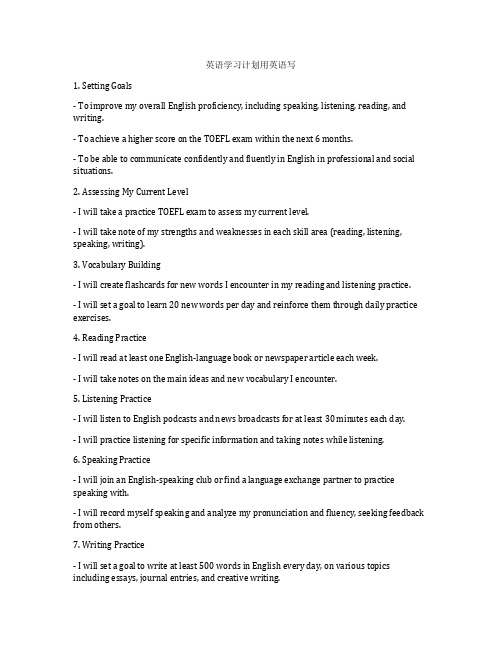
英语学习计划用英语写1. Setting Goals- To improve my overall English proficiency, including speaking, listening, reading, and writing.- To achieve a higher score on the TOEFL exam within the next 6 months.- To be able to communicate confidently and fluently in English in professional and social situations.2. Assessing My Current Level- I will take a practice TOEFL exam to assess my current level.- I will take note of my strengths and weaknesses in each skill area (reading, listening, speaking, writing).3. Vocabulary Building- I will create flashcards for new words I encounter in my reading and listening practice.- I will set a goal to learn 20 new words per day and reinforce them through daily practice exercises.4. Reading Practice- I will read at least one English-language book or newspaper article each week.- I will take notes on the main ideas and new vocabulary I encounter.5. Listening Practice- I will listen to English podcasts and news broadcasts for at least 30 minutes each day.- I will practice listening for specific information and taking notes while listening.6. Speaking Practice- I will join an English-speaking club or find a language exchange partner to practice speaking with.- I will record myself speaking and analyze my pronunciation and fluency, seeking feedback from others.7. Writing Practice- I will set a goal to write at least 500 words in English every day, on various topics including essays, journal entries, and creative writing.- I will ask for feedback from native speakers or language teachers to improve my writing skills.8. Grammar and Syntax- I will review English grammar rules and practice using them in sentences and paragraphs. - I will seek out grammar exercises and resources to reinforce my understanding of English syntax and sentence structure.9. Test Preparation- I will take regular practice tests for the TOEFL exam to track my progress and identify areas for improvement.- I will seek out test preparation materials and practice exams to familiarize myself with the test format and time constraints.10. Seeking Feedback and Support- I will ask for feedback from native English speakers and language teachers to help me identify areas for improvement.- I will join online forums and communities to connect with others who are also learning English, to share resources and experiences.11. Time Management- I will allocate specific time slots each day for English practice, including reading, listening, speaking, and writing practice.- I will track my progress and adjust my study plan as needed to maintain consistency and motivation.12. Celebrating Progress- I will set milestone goals for my English learning, such as reaching a certain score on a practice test or successfully completing a writing challenge.- I will reward myself for achieving these milestones, to maintain my motivation and enthusiasm for learning English.In conclusion, my English learning plan is comprehensive and structured, with a focus on building all four language skills and preparing for the TOEFL exam. I am committed to dedicating time and effort to achieve my goals and improve my English proficiency. With regular practice, feedback, and support, I am confident that I will make significant progress in my English language journey.。
学习计划用英语怎么说
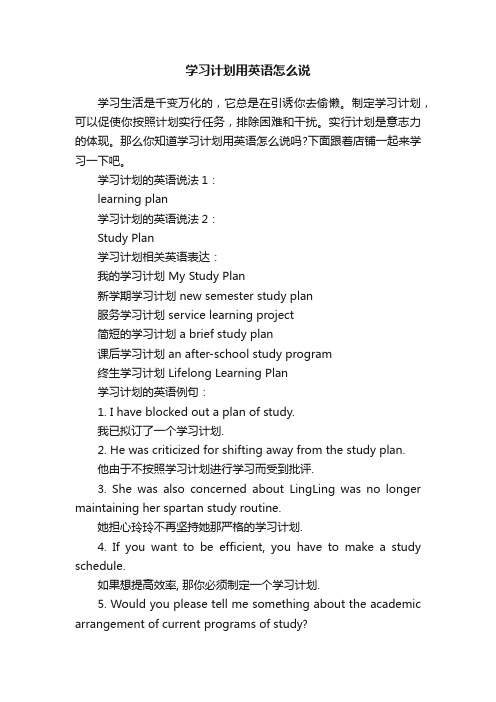
学习计划用英语怎么说学习生活是千变万化的,它总是在引诱你去偷懒。
制定学习计划,可以促使你按照计划实行任务,排除困难和干扰。
实行计划是意志力的体现。
那么你知道学习计划用英语怎么说吗?下面跟着店铺一起来学习一下吧。
学习计划的英语说法1:learning plan学习计划的英语说法2:Study Plan学习计划相关英语表达:我的学习计划 My Study Plan新学期学习计划 new semester study plan服务学习计划 service learning project简短的学习计划 a brief study plan课后学习计划 an after-school study program终生学习计划 Lifelong Learning Plan学习计划的英语例句:1. I have blocked out a plan of study.我已拟订了一个学习计划.2. He was criticized for shifting away from the study plan.他由于不按照学习计划进行学习而受到批评.3. She was also concerned about LingLing was no longer maintaining her spartan study routine.她担心玲玲不再坚持她那严格的学习计划.4. If you want to be efficient, you have to make a study schedule.如果想提高效率, 那你必须制定一个学习计划.5. Would you please tell me something about the academic arrangement of current programs of study?你能告诉我目前学习计划的专业安排吗 ?6. Responsible for developing employees'capabilities development framework and leadership development learning plan.负责员工基本能力发展及领导力发展学习计划的设计执行.7. We'll adjust your equine study according to your lessons, frequency and goal.我们将请根据您的课时、频率、目标来制定马术学习计划.8. You could volunteer in an after - school study program to kids their schoolwork.你可以志愿在一个课后学习计划班里帮助孩子们写他们的学校作业.9. Each student has an advisor and an individual learning program.每个学生有一个指导老师和个人学习计划.10. Combien de temps comptez - vous rester en France? ( Combien de temps resterez - vous ? ).你的父母同意你赴法学习计划吗?11. TUTOR will design a personal course tailored to you.中方指导老师为您量身定做贴心的学习计划.12. She hasn't made her study plan, neither has my brother.她没有制订学习计划, 我弟弟也一样.13. We usually make our study plans at the beginning of term.我们通常是在开学初做学习计划.14. You should make a plan for your study ahead of time.你应该提前制定一个学习计划.15. Third, works out the thorough learning program, fosters the aware study habits.第三, 制定周密的学习计划, 养成自觉的学习习惯.。
英语学习计划的英文翻译
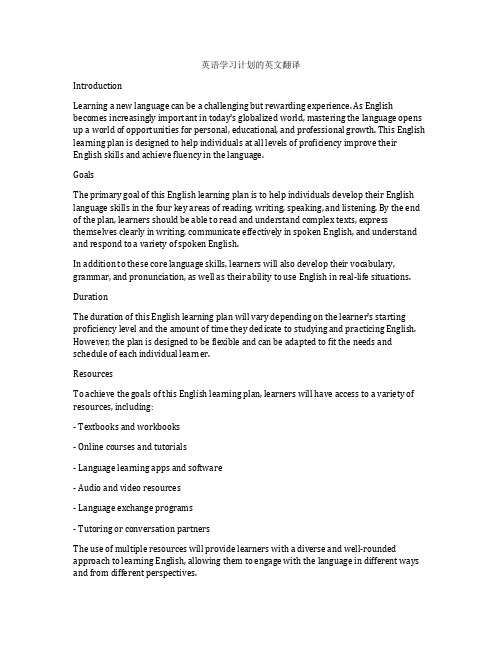
英语学习计划的英文翻译IntroductionLearning a new language can be a challenging but rewarding experience. As English becomes increasingly important in today's globalized world, mastering the language opens up a world of opportunities for personal, educational, and professional growth. This English learning plan is designed to help individuals at all levels of proficiency improve their English skills and achieve fluency in the language.GoalsThe primary goal of this English learning plan is to help individuals develop their English language skills in the four key areas of reading, writing, speaking, and listening. By the end of the plan, learners should be able to read and understand complex texts, express themselves clearly in writing, communicate effectively in spoken English, and understand and respond to a variety of spoken English.In addition to these core language skills, learners will also develop their vocabulary, grammar, and pronunciation, as well as their ability to use English in real-life situations. DurationThe duration of this English learning plan will vary depending on the learner's starting proficiency level and the amount of time they dedicate to studying and practicing English. However, the plan is designed to be flexible and can be adapted to fit the needs and schedule of each individual learner.ResourcesTo achieve the goals of this English learning plan, learners will have access to a variety of resources, including:- Textbooks and workbooks- Online courses and tutorials- Language learning apps and software- Audio and video resources- Language exchange programs- Tutoring or conversation partnersThe use of multiple resources will provide learners with a diverse and well-rounded approach to learning English, allowing them to engage with the language in different ways and from different perspectives.Study PlanThe study plan is divided into different stages, each of which focuses on a different aspect of language learning. Learners can progress through the plan at their own pace, and can dedicate as much time as necessary to each stage before moving on to the next.Stage 1: Building FoundationsThe first stage of the English learning plan focuses on building a solid foundation in the language. This stage is particularly important for beginners, as it lays the groundwork for more advanced language learning.- Start with the basics: The first step in learning any language is to familiarize yourself with its basic elements, such as the alphabet, pronunciation, and common greetings and phrases. Beginners should spend some time becoming comfortable with these fundamental aspects of English before moving on to more complex topics.- Vocabulary building: As learners become more comfortable with the basics of English, they can start to build their vocabulary by learning new words and phrases. This can be done through flashcards, vocabulary lists, or language learning apps. It's important for learners to practice using their new vocabulary in context in order to remember and retain it.- Grammar and sentence structure: Once learners have expanded their vocabulary, they can begin to focus on English grammar and sentence structure. This includes understanding the parts of speech, verb tenses, word order, and sentence construction. Practicing grammar exercises and reading and writing in English will help learners solidify their understanding of these concepts.Stage 2: Reading and Listening ComprehensionThe second stage of the English learning plan focuses on developing reading and listening comprehension skills. These skills are essential for understanding and interpreting written and spoken English.- Reading practice: Learners should engage with a variety of English texts, including books, articles, and online content. Reading can help learners improve their vocabulary, grammar, and comprehension, as well as provide exposure to different writing styles and genres. This stage also involves identifying the main ideas and supporting details in a text, and making inferences and predictions based on the information presented.- Listening practice: In addition to reading, learners should also practice listening to spoken English. This can be done through podcasts, audiobooks, radio programs, or language learning resources. Listening comprehension activities can help learners improve their ability to understand spoken English, identify specific details, and follow conversations and speeches.Stage 3: Writing and Speaking FluencyThe third stage of the English learning plan focuses on developing writing and speaking fluency. These skills are essential for expressing oneself and communicating effectively in English.- Writing practice: Learners should practice writing in English on a regular basis. This can include writing essays, reports, emails, or creative pieces. Writing exercises can help learners improve their ability to organize their thoughts, express themselves clearly, and use correct grammar, punctuation, and spelling.- Speaking practice: In addition to writing, learners should also practice speaking in English. This can involve engaging in conversations with native speakers, participating in language exchange programs, or practicing speaking exercises with a tutor or conversation partner. Speaking practice is important for improving pronunciation, fluency, and the ability to communicate verbally in English.Stage 4: Real-Life ApplicationsThe final stage of the English learning plan focuses on using English in real-life situations. This includes engaging with the language in everyday settings and applying language skills in practical contexts.- Real-life communication: Learners should seek out opportunities to use English in real-life situations, such as socializing with English speakers, participating in English-speaking clubs or events, or using English in professional and academic settings. Practicing English in real-life contexts can help learners become more confident and comfortable using the language in various situations.- Cultural immersion: In addition to using English in practical settings, learners should also immerse themselves in the cultural aspects of the language. This can involve exploring English-speaking countries, learning about English-speaking cultures and traditions, and engaging with English-language media, such as movies, music, and literature.ConclusionThis English learning plan is designed to help individuals improve their English language skills and achieve fluency in the language. By following the plan and dedicating time and effort to studying and practicing English, learners can develop their reading, writing, speaking, and listening skills, as well as their vocabulary, grammar, and pronunciation. With dedication and perseverance, learners can become proficient in English and open up a world of opportunities for personal, educational, and professional growth.。
英语学习计划用英语怎么说
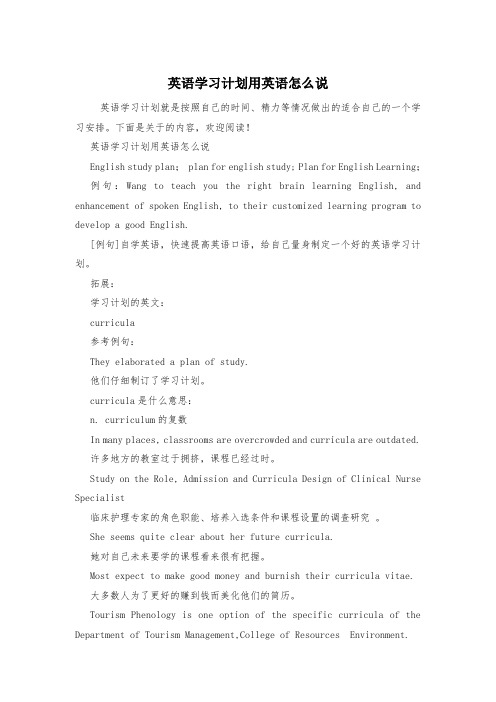
英语学习计划用英语怎么说英语学习计划就是按照自己的时间、精力等情况做出的适合自己的一个学习安排。
下面是关于的内容,欢迎阅读!英语学习计划用英语怎么说English study plan; plan for english study; Plan for English Learning;例句:Wang to teach you the right brain learning English, and enhancement of spoken English, to their customized learning program to develop a good English.[例句]自学英语,快速提高英语口语,给自己量身制定一个好的英语学习计划。
拓展:学习计划的英文:curricula参考例句:They elaborated a plan of study.他们仔细制订了学习计划。
curricula是什么意思:n. curriculum的复数In many places, classrooms are overcrowded and curricula are outdated.许多地方的教室过于拥挤,课程已经过时。
Study on the Role, Admission and Curricula Design of Clinical Nurse Specialist临床护理专家的角色职能、培养入选条件和课程设置的调查研究。
She seems quite clear about her future curricula.她对自己未来要学的课程看来很有把握。
Most expect to make good money and burnish their curricula vitae.大多数人为了更好的赚到钱而美化他们的简历。
Tourism Phenology is one option of the specific curricula of the Department of Tourism Management,College of Resources Environment.旅游物候课程是我院旅游管理专业一门具有校本特色的专业选修课。
用英语表达学习英语的计划
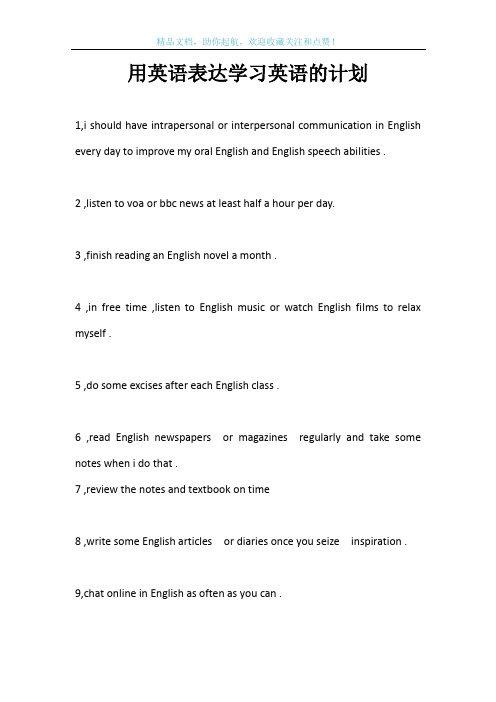
用英语表达学习英语的计划1,i should have intrapersonal or interpersonal communication in English every day to improve my oral English and English speech abilities .2 ,listen to voa or bbc news at least half a hour per day.3 ,finish reading an English novel a month .4 ,in free time ,listen to English music or watch English films to relax myself .5 ,do some excises after each English class .6 ,read English newspapers or magazines regularly and take some notes when i do that .7 ,review the notes and textbook on time8 ,write some English articles or diaries once you seize inspiration .9,chat online in English as often as you can .10 , recite at least two beautiful English passages per semesterthx...First step “ Choose your Goal” for learning English as a Second LanguageGoals are your motivation. Goals can remind you of purpose and direction. Why do you need English as a second or third language. What do you wish to accomplish with English as a second language? Studying ESL requires thousands of hours of real effort - you need motivation and endurance to be able to study or work using the English language with native speakers.Top 15 Goals for studying English as a second language* Immigrate into an English speaking country* Get hired at a first job* Be hired at a better company* Be promoted in your company* Sell and market your products to English speaking countries* Be able to operate a business completely in English.* Publish an authoritative business, scientific journal article in English* Be admitted and study in a North American university.* Be admitted and study in a North American university graduate program.* Travel independently in English speaking countries.* As an Artist, perform for English speaking audiences* Enjoy entertainment produced by English speaking artists* Use English instructions for computer applications. Surf the net in English* Score 950 on the Toeic test or 280 on the new Toefl exam* Study English Literature in the original textSecond step: “Select the best Learning Methods” - how you learn most efficientlyExamples of questions to determine “how you learn best”* What English can you learn the most while studying alone?* What English can you learn the most studying in a group?* Can you listen once and remember the pronunciation andvocabulary?* Does it help to see pictures of nouns or action verbs demonstrated?* Do you have to write and repeat words to memorize vocabulary?* How many times and ways must you use a word to “know” its proper context?* How often do you have to repeat lessons?* Can you create and use mnemonics to remember lists* Can you benefit using accelerated English language learning methods* Does music or games help you to relax making learning easier?Third step “Form a Plan” use the best learning stages to reach study GoalsAn example of a two year study plan with four stages to learn English:* (First stage - 6 months)Start with picture dictionaries to begin vocabulary, use the ESL in Canada 1000 most used word list as the initial core vocabulary, start to study pronunciation by watching English TV, listen to taped conversations, for 1 - 2 hours each day.* (Second stage - 6 months)Add grammar, see the ESL in Canada Grammar Blog for 10 most important English Grammar points, start to study English punctuation, spelling, vocabulary studies, start to read newspapers/magazines, begin a vocabulary diary for 1 - 2 hours each day* (Third stage - 6 months)Add one hour of English conversation classes everyday for 6 months, review grammar and vocabulary, add to vocabulary diary each day.* (Fourth stage - 6 months)Travel to Canada for 400 hours of English conversation classes, perform some volunteer work, take a special interest course and travel using English.* (After the Two Year Plan)Continuing ESL education program with one English conversation class per week or start your own English Conversation Club, watch English News on TV, read English newspapersFourth step “create a Cost & Benefit Analysis for your Plan”* What FREE English learning resources are available on the internet?* What FREE English learning resources are at the library, community or cultural centers?* What FREE English Learning clubs offer conversation classes?* What FREE English Language exchange clubs offer conversation classes?* Compare the costs of books, texts, tapes, Cd’s for self-study.* Analyze the cost of instruction by tutors in a small group of 3 or 4 * Analyze the cost of instruction at local English schools* Analyze costs of foreign travel and accommodation to study English abroad.Fifth step “Start your Plan”For help with free learn English resources and to plan your trip to study English as a second language in Canada {or USA} use our registration form to tell us what you require.Need help with your Plan?Use the following chart and Answer questions with a %How do you like to study?By yourself____%One partner____%Small groups____%Large groups____%Total of this group = 100 %What learning materials do you like to use? audio CD’s or cassettes____%DVD’s, videos or television____%CALL and interactive computer programs____% picture dictionaries____%ESL workbooks____%regular subject text books____% newspapers, magazines____%Total of this group = 100 %Conversation Practicegroup pronunciation drills____% Conversations with native speakers____% Low structure ESL student conversation____% High structure ESL teacher talk____%Total of this group = 100 %1.listen to english programmes2.read more english contents.3.speak english out loud to practise oral4.memorize certain english words everyday5.count numbers using english.6.chat with english7.write english everyday8. listen to english songs and try to sing them9.get extra lessons10.have someone that can help you at home with english.。
英语学习计划的英文是什么
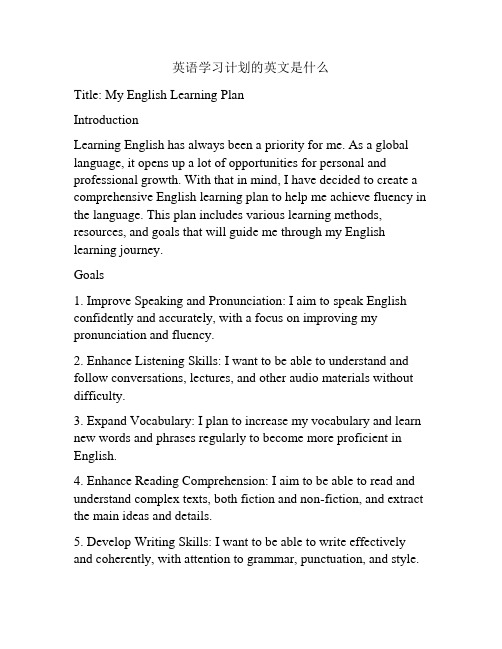
英语学习计划的英文是什么Title: My English Learning PlanIntroductionLearning English has always been a priority for me. As a global language, it opens up a lot of opportunities for personal and professional growth. With that in mind, I have decided to create a comprehensive English learning plan to help me achieve fluency in the language. This plan includes various learning methods, resources, and goals that will guide me through my English learning journey.Goals1. Improve Speaking and Pronunciation: I aim to speak English confidently and accurately, with a focus on improving my pronunciation and fluency.2. Enhance Listening Skills: I want to be able to understand and follow conversations, lectures, and other audio materials without difficulty.3. Expand Vocabulary: I plan to increase my vocabulary and learn new words and phrases regularly to become more proficient in English.4. Enhance Reading Comprehension: I aim to be able to read and understand complex texts, both fiction and non-fiction, and extract the main ideas and details.5. Develop Writing Skills: I want to be able to write effectively and coherently, with attention to grammar, punctuation, and style.Learning Methods1. Private Tutoring: I have decided to engage a private tutor who can provide me with personalized lessons tailored to my specific needs and learning style.2. Language Exchange: I will be participating in language exchange programs to practice speaking and listening with native English speakers and help them learn my native language in return.3. Online Courses: I will enroll in online English courses to improve my grammar, vocabulary, and overall language skills. Websites such as Coursera, edX, and Rosetta Stone offer a wide range of courses that I can take advantage of.4. Reading: I plan to read English books, newspapers, and magazines regularly to improve my reading comprehension and expand my vocabulary. I will also make use of audiobooks to enhance my listening skills.5. Writing Practice: I will practice writing in English by keeping a journal, writing essays, and participating in online writing communities to receive feedback and improve my writing skills.6. Language Apps: I will use language learning apps such as Duolingo, Babbel, and HelloTalk to supplement my learning and practice English in a fun and interactive way.Resources1. Books: I will be reading a variety of English books, both fiction and non-fiction, to expose myself to different styles of writing and expand my vocabulary.2. Audio Materials: I will listen to podcasts, audiobooks, and English radio stations to improve my listening skills and familiarize myself with different accents and speaking styles.3. Grammar and Vocabulary Books: I will use grammar and vocabulary books to reinforce my knowledge of English grammar rules and learn new words and phrases.4. Online Platforms: I will utilize online platforms such as YouTube, Ted Talks, and Khan Academy for access to a wide range of English learning videos, lectures, and resources. Progress TrackingTo track my progress, I will:1. Set specific and measurable goals for each aspect of my English learning plan.2. Keep a language learning journal to record my daily learning activities, achievements, and challenges.3. Take regular tests and quizzes to assess my proficiency in speaking, listening, reading, and writing.4. Seek feedback from my tutor, language exchange partners, and online communities to identify areas for improvement and track my progress over time.ConclusionI am committed to following this English learning plan with dedication and consistency. I believe that by combining various learning methods, utilizing resources effectively, and tracking my progress regularly, I will be able to achieve my goals and become fluent in English. I am excited about the journey ahead and lookforward to the day when I can confidently communicate in English in any situation.。
英语学习计划的英文怎么说
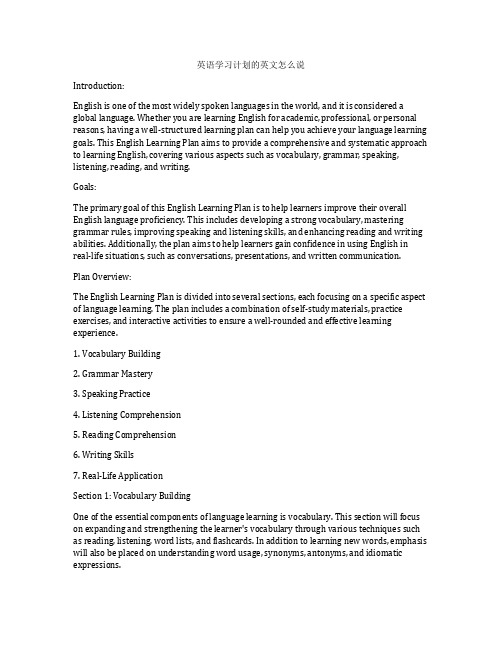
英语学习计划的英文怎么说Introduction:English is one of the most widely spoken languages in the world, and it is considered a global language. Whether you are learning English for academic, professional, or personal reasons, having a well-structured learning plan can help you achieve your language learning goals. This English Learning Plan aims to provide a comprehensive and systematic approach to learning English, covering various aspects such as vocabulary, grammar, speaking, listening, reading, and writing.Goals:The primary goal of this English Learning Plan is to help learners improve their overall English language proficiency. This includes developing a strong vocabulary, mastering grammar rules, improving speaking and listening skills, and enhancing reading and writing abilities. Additionally, the plan aims to help learners gain confidence in using English in real-life situations, such as conversations, presentations, and written communication.Plan Overview:The English Learning Plan is divided into several sections, each focusing on a specific aspect of language learning. The plan includes a combination of self-study materials, practice exercises, and interactive activities to ensure a well-rounded and effective learning experience.1. Vocabulary Building2. Grammar Mastery3. Speaking Practice4. Listening Comprehension5. Reading Comprehension6. Writing Skills7. Real-Life ApplicationSection 1: Vocabulary BuildingOne of the essential components of language learning is vocabulary. This section will focus on expanding and strengthening the learner's vocabulary through various techniques such as reading, listening, word lists, and flashcards. In addition to learning new words, emphasis will also be placed on understanding word usage, synonyms, antonyms, and idiomatic expressions.Section 2: Grammar MasteryGrammar plays a crucial role in language proficiency. This section will cover the fundamentals of English grammar, including parts of speech, sentence structure, verb tenses, and punctuation. Learners will have access to grammar exercises, worksheets, and interactive quizzes to reinforce their understanding of grammar rules and usage.Section 3: Speaking PracticeDeveloping speaking skills is vital for effective communication in English. This section will provide opportunities for learners to practice speaking through role-plays, conversations, and pronunciation exercises. In addition, learners will have access to audio materials, language exchange partners, and speaking clubs to improve their speaking fluency and accuracy.Section 4: Listening ComprehensionListening comprehension is essential for understanding spoken English in various contexts. This section will include listening exercises, audio materials, and comprehension activities to improve learners' listening skills. Emphasis will be placed on understanding different accents, tones, and styles of speech.Section 5: Reading ComprehensionReading is an excellent way to improve vocabulary, grammar, and comprehension skills. This section will provide reading materials such as articles, short stories, and news reports, along with comprehension questions and activities to evaluate learners' understanding of the text. Additionally, learners will have the opportunity to explore different genres and styles of writing to broaden their reading skills.Section 6: Writing SkillsWriting is a valuable skill for expressing ideas and communicating effectively. This section will focus on developing writing skills through various writing assignments, essays, and creative writing exercises. Learners will also receive feedback and guidance on their writing to help them improve their written communication skills.Section 7: Real-Life ApplicationThe final section of the English Learning Plan will focus on real-life application of language skills. Learners will be encouraged to engage in conversations, discussions, presentations, and language activities in real-life settings. This section aims to help learners apply their language skills in practical, everyday situations.Conclusion:The English Learning Plan provides a comprehensive and structured approach to learning English, covering all essential aspects of language proficiency. By following this plan,learners can improve their vocabulary, grammar, speaking, listening, reading, and writing skills, ultimately gaining confidence and proficiency in using English in various contexts. With dedication, practice, and commitment, learners can achieve their language learning goals and become fluent and proficient English speakers.。
学习计划的英文是怎么说
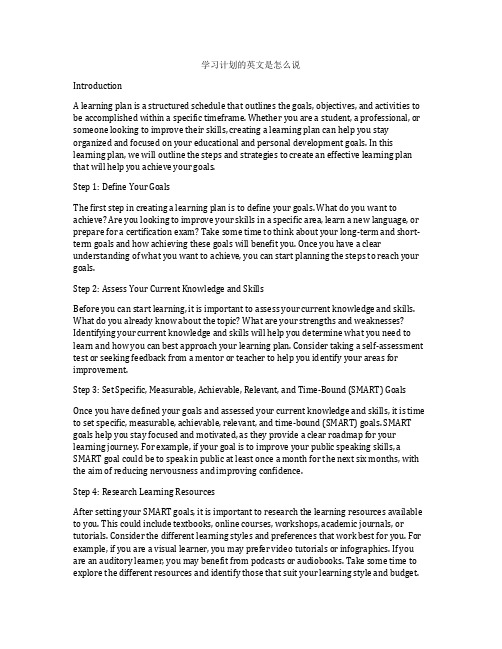
学习计划的英文是怎么说IntroductionA learning plan is a structured schedule that outlines the goals, objectives, and activities to be accomplished within a specific timeframe. Whether you are a student, a professional, or someone looking to improve their skills, creating a learning plan can help you stay organized and focused on your educational and personal development goals. In this learning plan, we will outline the steps and strategies to create an effective learning plan that will help you achieve your goals.Step 1: Define Your GoalsThe first step in creating a learning plan is to define your goals. What do you want to achieve? Are you looking to improve your skills in a specific area, learn a new language, or prepare for a certification exam? Take some time to think about your long-term and short-term goals and how achieving these goals will benefit you. Once you have a clear understanding of what you want to achieve, you can start planning the steps to reach your goals.Step 2: Assess Your Current Knowledge and SkillsBefore you can start learning, it is important to assess your current knowledge and skills. What do you already know about the topic? What are your strengths and weaknesses? Identifying your current knowledge and skills will help you determine what you need to learn and how you can best approach your learning plan. Consider taking a self-assessment test or seeking feedback from a mentor or teacher to help you identify your areas for improvement.Step 3: Set Specific, Measurable, Achievable, Relevant, and Time-Bound (SMART) GoalsOnce you have defined your goals and assessed your current knowledge and skills, it is time to set specific, measurable, achievable, relevant, and time-bound (SMART) goals. SMART goals help you stay focused and motivated, as they provide a clear roadmap for your learning journey. For example, if your goal is to improve your public speaking skills, a SMART goal could be to speak in public at least once a month for the next six months, with the aim of reducing nervousness and improving confidence.Step 4: Research Learning ResourcesAfter setting your SMART goals, it is important to research the learning resources available to you. This could include textbooks, online courses, workshops, academic journals, or tutorials. Consider the different learning styles and preferences that work best for you. For example, if you are a visual learner, you may prefer video tutorials or infographics. If you are an auditory learner, you may benefit from podcasts or audiobooks. Take some time to explore the different resources and identify those that suit your learning style and budget.Step 5: Create a Learning ScheduleWith your SMART goals and learning resources in mind, it is time to create a learning schedule. This schedule should outline the specific activities you need to undertake and when you plan to complete them. Consider breaking down your goals into smaller, manageable tasks, and allocate specific time slots for each task. For example, if your goal is to learn a new language, your schedule could include daily vocabulary drills, weekly grammar exercises, and monthly conversation practice with a language partner.Step 6: Implement Your Learning PlanNow that you have a clear learning plan in place, it is time to start implementing it. Be disciplined, and stick to your schedule as much as possible. Set reminders on your calendar, use to-do lists, and find an accountability partner to help you stay on track. Making learning a habit will ensure that you make consistent progress towards your goals.Step 7: Monitor Your ProgressAs you work through your learning plan, it is important to monitor your progress regularly. Take some time to assess whether you are meeting your goals and if the learning resources and schedule are working for you. If you find that you are struggling to achieve your goals, it may be necessary to make adjustments to your plan. This could involve seeking additional help from a mentor or teacher, reevaluating your learning resources, or modifying your schedule.Step 8: Reflect and AdaptAt the end of your learning plan, take some time to reflect on your achievements, challenges, and areas for improvement. What did you learn throughout this process? What worked well for you, and what didn't? Use this reflection to adapt and refine your future learning plans, so you can continue to grow and develop your skills.ConclusionCreating a learning plan is an effective way to achieve your educational and personal development goals. By following the steps outlined in this plan, you can create a strategic roadmap for your learning journey and stay focused on achieving success. Remember that learning is a lifelong process, and with a well-structured plan, you can continue to grow and develop your knowledge and skills.。
学习计划英语怎么说
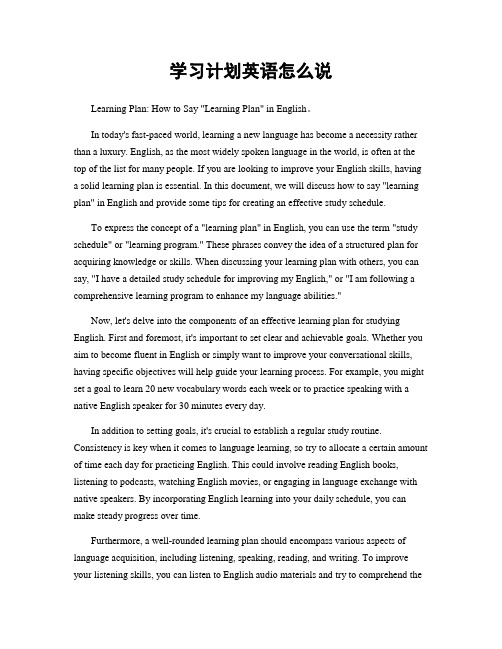
学习计划英语怎么说Learning Plan: How to Say "Learning Plan" in English。
In today's fast-paced world, learning a new language has become a necessity rather than a luxury. English, as the most widely spoken language in the world, is often at the top of the list for many people. If you are looking to improve your English skills, having a solid learning plan is essential. In this document, we will discuss how to say "learning plan" in English and provide some tips for creating an effective study schedule.To express the concept of a "learning plan" in English, you can use the term "study schedule" or "learning program." These phrases convey the idea of a structured plan for acquiring knowledge or skills. When discussing your learning plan with others, you can say, "I have a detailed study schedule for improving my English," or "I am following a comprehensive learning program to enhance my language abilities."Now, let's delve into the components of an effective learning plan for studying English. First and foremost, it's important to set clear and achievable goals. Whether you aim to become fluent in English or simply want to improve your conversational skills, having specific objectives will help guide your learning process. For example, you might set a goal to learn 20 new vocabulary words each week or to practice speaking with a native English speaker for 30 minutes every day.In addition to setting goals, it's crucial to establish a regular study routine. Consistency is key when it comes to language learning, so try to allocate a certain amount of time each day for practicing English. This could involve reading English books, listening to podcasts, watching English movies, or engaging in language exchange with native speakers. By incorporating English learning into your daily schedule, you can make steady progress over time.Furthermore, a well-rounded learning plan should encompass various aspects of language acquisition, including listening, speaking, reading, and writing. To improve your listening skills, you can listen to English audio materials and try to comprehend thecontent. For speaking practice, engage in conversations with others or record yourself speaking and analyze your pronunciation. Reading English texts and writing short essays or journal entries can help enhance your reading and writing abilities.Another important element of a successful learning plan is the use of resources and materials. There are countless resources available for learning English, such as textbooks, online courses, language learning apps, and language exchange platforms. It's beneficial to explore different resources and find the ones that best suit your learning style and goals. Additionally, seeking feedback from teachers, language partners, or online communities can provide valuable insights and support for your language learning journey.In conclusion, creating a solid learning plan is essential for making progress in English language acquisition. By setting clear goals, establishing a consistent study routine, incorporating diverse learning activities, and utilizing relevant resources, you can effectively improve your English skills. Remember that language learning is a gradual process, so be patient and persistent in your efforts. With a well-designed learning plan and dedication to your studies, you can achieve fluency and proficiency in English. Good luck!。
英语学习计划用英文怎么写

英语学习计划用英文怎么写Introduction:English is a widely spoken language that is used for communication, business, travel, and education around the world. As a non-native English speaker, it is important to have a well-planned and organized learning schedule to improve language skills. This English learning plan aims to provide guidelines and strategies to enhance English proficiency in listening, speaking, reading, and writing.Objective:The main objective of this English learning plan is to develop strong language skills in listening, speaking, reading, and writing. The plan will focus on improving vocabulary, grammar, pronunciation, and fluency. The ultimate goal is to enhance communication abilities and confidence in using English in various contexts.Learning Materials:The following materials will be used for English learning:1. Textbooks: English grammar and vocabulary textbooks will be utilized to enhance understanding and knowledge of English language structure and usage.2. Online resources: Various online platforms, including language learning websites, podcasts, YouTube channels, and language exchange apps will be utilized for listening practice, speaking exercises, and reading comprehension.3. Language tools: English language tools such as dictionaries, grammar checkers, and language learning apps will be used to improve language proficiency.Study Schedule:The learning plan will be divided into four main components: listening, speaking, reading, and writing. Each component will have specific strategies and activities to improve language skills.1. Listening:- Listen to English podcasts and audio books for at least 30 minutes daily.- Practice listening comprehension exercises to improve understanding of spoken English. - Watch English movies, TV shows, and news programs with English subtitles for better comprehension.2. Speaking:- Engage in daily conversations with language exchange partners or English-speaking friends.- Practice speaking exercises and dialogue simulations to improve pronunciation and fluency.- Record speaking sessions and listen to identify areas for improvement.3. Reading:- Read English articles, blogs, and books for at least 30 minutes daily.- Practice reading comprehension exercises to improve understanding of written English. - Expand vocabulary by reading different genres of English literature.4. Writing:- Write daily journal entries to practice expressing thoughts and ideas in English.- Practice writing essays, summaries, and emails to improve writing skills.- Use language tools to check grammar, vocabulary, and sentence structure.Review and Evaluation:Regular evaluations will be conducted to assess language proficiency and progress. Listening and speaking skills will be evaluated through conversations and oral presentations. Reading and writing skills will be assessed through comprehension tests and writing assignments. The feedback and results of evaluations will be used to adjust the learning plan and improve language skills.Conclusion:This English learning plan aims to provide a structured and comprehensive approach to improving language skills. By focusing on listening, speaking, reading, and writing, the plan aims to enhance vocabulary, grammar, pronunciation, and fluency. With consistent practice and dedication, the ultimate goal of developing strong communication abilities and confidence in using English will be achieved.。
学习计划用英文翻译
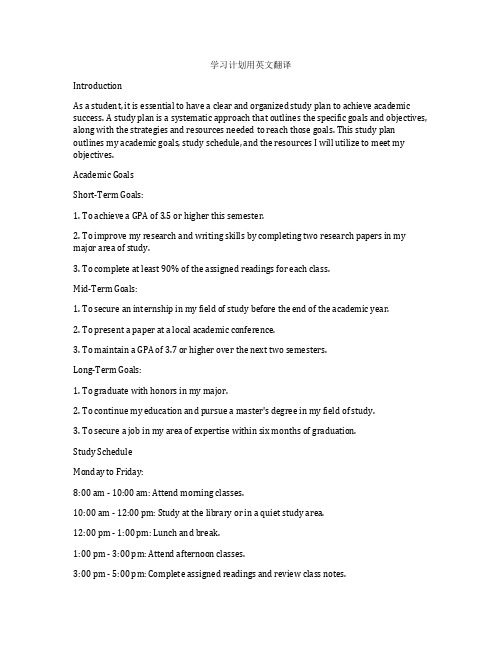
学习计划用英文翻译IntroductionAs a student, it is essential to have a clear and organized study plan to achieve academic success. A study plan is a systematic approach that outlines the specific goals and objectives, along with the strategies and resources needed to reach those goals. This study plan outlines my academic goals, study schedule, and the resources I will utilize to meet my objectives.Academic GoalsShort-Term Goals:1. To achieve a GPA of 3.5 or higher this semester.2. To improve my research and writing skills by completing two research papers in my major area of study.3. To complete at least 90% of the assigned readings for each class.Mid-Term Goals:1. To secure an internship in my field of study before the end of the academic year.2. To present a paper at a local academic conference.3. To maintain a GPA of 3.7 or higher over the next two semesters.Long-Term Goals:1. To graduate with honors in my major.2. To continue my education and pursue a master's degree in my field of study.3. To secure a job in my area of expertise within six months of graduation.Study ScheduleMonday to Friday:8:00 am - 10:00 am: Attend morning classes.10:00 am - 12:00 pm: Study at the library or in a quiet study area.12:00 pm - 1:00 pm: Lunch and break.1:00 pm - 3:00 pm: Attend afternoon classes.3:00 pm - 5:00 pm: Complete assigned readings and review class notes.5:00 pm - 6:00 pm: Dinner and break.6:00 pm - 9:00 pm: Work on assignments and projects.Saturday and Sunday:10:00 am - 1:00 pm: Review class materials and prepare for the upcoming week.1:00 pm - 2:00 pm: Lunch and break.2:00 pm - 5:00 pm: Complete any pending assignments.5:00 pm - 6:00 pm: Dinner and break.6:00 pm - 9:00 pm: Work on long-term projects or research papers.Study ResourcesTextbooks: I will make use of the recommended textbooks for each course and ensure that I complete all assigned readings.Online Resources: I will utilize online resources such as scholarly articles, journals, and databases to supplement my understanding of the course material and to conduct research for my papers.Study Groups: I will form study groups with my classmates to discuss and review class materials and prepare for exams.Office Hours: I will make use of my professors' office hours to seek clarification on class materials and to receive guidance on my research and writing projects.Library: I will make use of the library resources to find additional reading materials, access academic journals, and study in a quiet and conducive environment.Tutoring: If I encounter difficulties in any subject, I will seek tutoring or academic support to improve my understanding and performance in that area.ConclusionA well-thought-out study plan is crucial for achieving academic success. By setting clear and achievable goals, maintaining a consistent study schedule, and utilizing the available resources effectively, I am confident that I will make significant progress towards my academic aspirations. I am committed to staying focused and disciplined in my approach to learning, and I am determined to excel in all my academic endeavors.。
英语学习计划用英语怎么说
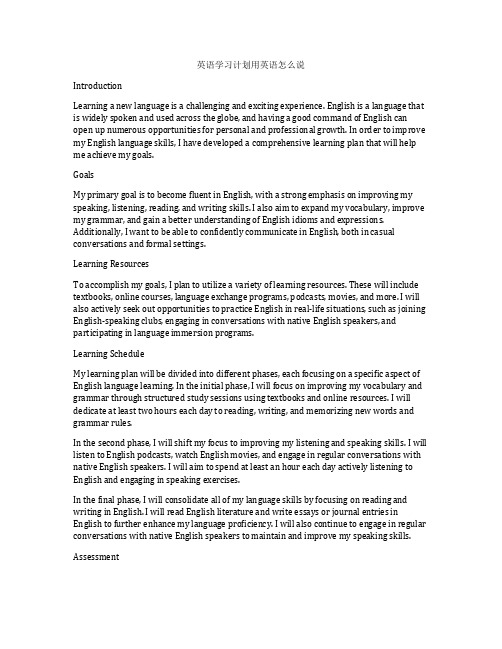
英语学习计划用英语怎么说IntroductionLearning a new language is a challenging and exciting experience. English is a language that is widely spoken and used across the globe, and having a good command of English can open up numerous opportunities for personal and professional growth. In order to improve my English language skills, I have developed a comprehensive learning plan that will help me achieve my goals.GoalsMy primary goal is to become fluent in English, with a strong emphasis on improving my speaking, listening, reading, and writing skills. I also aim to expand my vocabulary, improve my grammar, and gain a better understanding of English idioms and expressions. Additionally, I want to be able to confidently communicate in English, both in casual conversations and formal settings.Learning ResourcesTo accomplish my goals, I plan to utilize a variety of learning resources. These will include textbooks, online courses, language exchange programs, podcasts, movies, and more. I will also actively seek out opportunities to practice English in real-life situations, such as joining English-speaking clubs, engaging in conversations with native English speakers, and participating in language immersion programs.Learning ScheduleMy learning plan will be divided into different phases, each focusing on a specific aspect of English language learning. In the initial phase, I will focus on improving my vocabulary and grammar through structured study sessions using textbooks and online resources. I will dedicate at least two hours each day to reading, writing, and memorizing new words and grammar rules.In the second phase, I will shift my focus to improving my listening and speaking skills. I will listen to English podcasts, watch English movies, and engage in regular conversations with native English speakers. I will aim to spend at least an hour each day actively listening to English and engaging in speaking exercises.In the final phase, I will consolidate all of my language skills by focusing on reading and writing in English. I will read English literature and write essays or journal entries in English to further enhance my language proficiency. I will also continue to engage in regular conversations with native English speakers to maintain and improve my speaking skills. AssessmentThroughout my learning plan, I will continuously assess my progress to identify areas that need improvement. I will measure my improvement by tracking the number of new words I have learned, the fluency of my speaking, and the complexity of my writing. Additionally, I will seek feedback from language instructors and native speakers to gain insights into areas that need further attention.ConclusionLearning a new language requires dedication, perseverance, and a well-structured plan. By following my English learning plan, I am confident that I will achieve my goals and become fluent in English. I am excited about the opportunities that learning English will bring, and I look forward to the journey ahead.Overall, the learning plan is aimed at achieving fluency in English through a systematic approach that focuses on all aspects of language learning. It emphasizes the use of various resources and activities to enhance vocabulary, grammar, listening, speaking, reading, and writing skills. Additionally, it incorporates continuous assessment and feedback to ensure steady progress. With dedication and consistent effort, I am confident that this learning plan will lead to significant improvement in my English language skills.。
学习计划英文怎么写
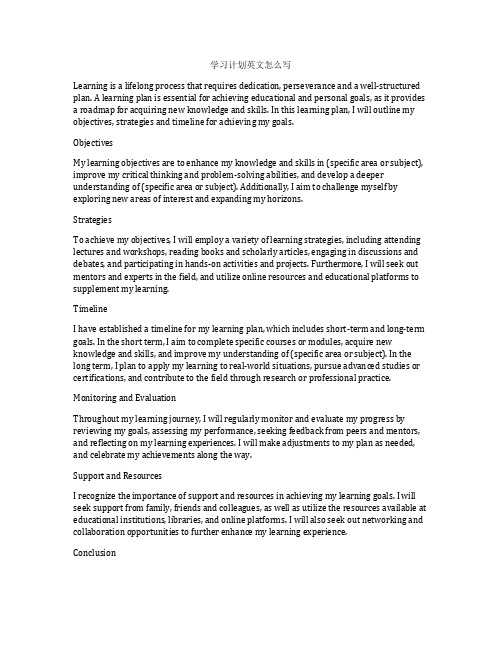
学习计划英文怎么写Learning is a lifelong process that requires dedication, perseverance and a well-structured plan. A learning plan is essential for achieving educational and personal goals, as it provides a roadmap for acquiring new knowledge and skills. In this learning plan, I will outline my objectives, strategies and timeline for achieving my goals.ObjectivesMy learning objectives are to enhance my knowledge and skills in (specific area or subject), improve my critical thinking and problem-solving abilities, and develop a deeper understanding of (specific area or subject). Additionally, I aim to challenge myself by exploring new areas of interest and expanding my horizons.StrategiesTo achieve my objectives, I will employ a variety of learning strategies, including attending lectures and workshops, reading books and scholarly articles, engaging in discussions and debates, and participating in hands-on activities and projects. Furthermore, I will seek out mentors and experts in the field, and utilize online resources and educational platforms to supplement my learning.TimelineI have established a timeline for my learning plan, which includes short-term and long-term goals. In the short term, I aim to complete specific courses or modules, acquire new knowledge and skills, and improve my understanding of (specific area or subject). In the long term, I plan to apply my learning to real-world situations, pursue advanced studies or certifications, and contribute to the field through research or professional practice.Monitoring and EvaluationThroughout my learning journey, I will regularly monitor and evaluate my progress by reviewing my goals, assessing my performance, seeking feedback from peers and mentors, and reflecting on my learning experiences. I will make adjustments to my plan as needed, and celebrate my achievements along the way.Support and ResourcesI recognize the importance of support and resources in achieving my learning goals. I will seek support from family, friends and colleagues, as well as utilize the resources available at educational institutions, libraries, and online platforms. I will also seek out networking and collaboration opportunities to further enhance my learning experience.ConclusionIn conclusion, this learning plan outlines my objectives, strategies, timeline, monitoring and evaluation methods, and support and resources for achieving my educational and personal goals. I am committed to dedicating time and effort to my learning journey, and look forward to the personal growth and fulfillment that comes with expanding my knowledge and skills.。
学习计划的英语
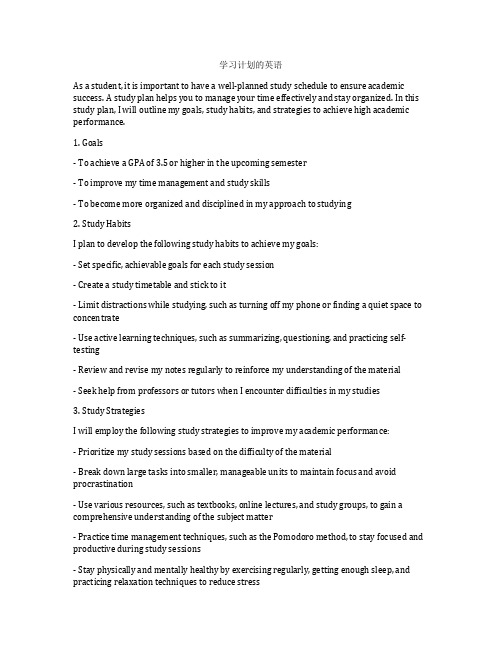
学习计划的英语As a student, it is important to have a well-planned study schedule to ensure academic success. A study plan helps you to manage your time effectively and stay organized. In this study plan, I will outline my goals, study habits, and strategies to achieve high academic performance.1. Goals- To achieve a GPA of 3.5 or higher in the upcoming semester- To improve my time management and study skills- To become more organized and disciplined in my approach to studying2. Study HabitsI plan to develop the following study habits to achieve my goals:- Set specific, achievable goals for each study session- Create a study timetable and stick to it- Limit distractions while studying, such as turning off my phone or finding a quiet space to concentrate- Use active learning techniques, such as summarizing, questioning, and practicing self-testing- Review and revise my notes regularly to reinforce my understanding of the material- Seek help from professors or tutors when I encounter difficulties in my studies3. Study StrategiesI will employ the following study strategies to improve my academic performance:- Prioritize my study sessions based on the difficulty of the material- Break down large tasks into smaller, manageable units to maintain focus and avoid procrastination- Use various resources, such as textbooks, online lectures, and study groups, to gain a comprehensive understanding of the subject matter- Practice time management techniques, such as the Pomodoro method, to stay focused and productive during study sessions- Stay physically and mentally healthy by exercising regularly, getting enough sleep, and practicing relaxation techniques to reduce stress4. Study ScheduleMy study schedule for the upcoming semester will be as follows: Monday:- 9:00 am – 11:00 am: Review notes for upcoming lectures- 1:00 pm – 3:00 pm: Read and take notes on assigned readings- 4:00 pm – 6:00 pm: Work on assignments and review class material Tuesday:- 10:00 am – 12:00 pm: Attend classes- 1:00 pm – 3:00 pm: Review notes and clarify any uncertainties- 4:00 pm – 6:00 pm: Study for upcoming exams or quizzes Wednesday:- 9:00 am – 11:00 am: Review notes for upcoming lectures- 1:00 pm – 3:00 pm: Read and take notes on assigned readings- 4:00 pm – 6:00 pm: Work on assignments and review class material Thursday:- 10:00 am – 12:00 pm: Attend classes- 1:00 pm – 3:00 pm: Review notes and clarify any uncertainties- 4:00 pm – 6:00 pm: Study for upcoming exams or quizzes Friday:- 9:00 am – 11:00 am: Review notes for upcoming lectures- 1:00 pm – 3:00 pm: Read and take notes on assigned readings- 4:00 pm – 6:00 pm: Work on assignments and review class material Saturday:- 10:00 am – 12:00 pm: Review notes and study for upcoming exams - 1:00 pm – 3:00 pm: Work on assignments and review class material - 4:00 pm – 6:00 pm: Review and revise notes from the weekSunday:- Rest and relaxationThis study plan will help me to stay organized, focused, and motivated to achieve my academic goals. By implementing effective study habits and strategies, I am confident that I will be able to succeed in my studies and excel in my academic pursuits. I look forward to the challenges and opportunities that the upcoming semester will bring, and I am committed to putting in the effort and dedication needed to achieve academic success.。
英语学习计划的英语翻译
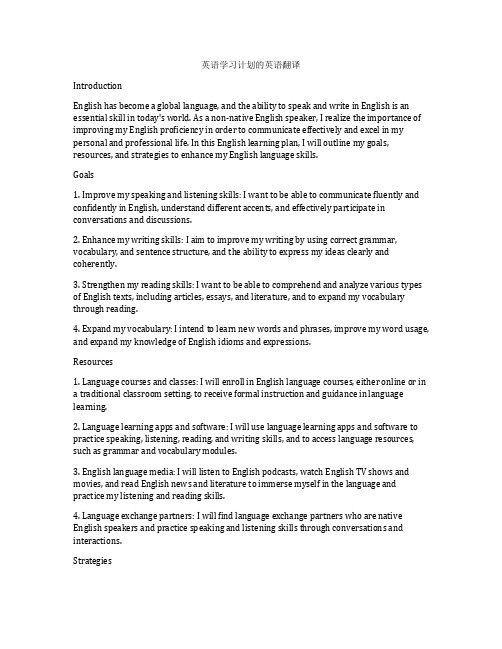
英语学习计划的英语翻译IntroductionEnglish has become a global language, and the ability to speak and write in English is an essential skill in today's world. As a non-native English speaker, I realize the importance of improving my English proficiency in order to communicate effectively and excel in my personal and professional life. In this English learning plan, I will outline my goals, resources, and strategies to enhance my English language skills.Goals1. Improve my speaking and listening skills: I want to be able to communicate fluently and confidently in English, understand different accents, and effectively participate in conversations and discussions.2. Enhance my writing skills: I aim to improve my writing by using correct grammar, vocabulary, and sentence structure, and the ability to express my ideas clearly and coherently.3. Strengthen my reading skills: I want to be able to comprehend and analyze various types of English texts, including articles, essays, and literature, and to expand my vocabulary through reading.4. Expand my vocabulary: I intend to learn new words and phrases, improve my word usage, and expand my knowledge of English idioms and expressions.Resources1. Language courses and classes: I will enroll in English language courses, either online or ina traditional classroom setting, to receive formal instruction and guidance in language learning.2. Language learning apps and software: I will use language learning apps and software to practice speaking, listening, reading, and writing skills, and to access language resources, such as grammar and vocabulary modules.3. English language media: I will listen to English podcasts, watch English TV shows and movies, and read English news and literature to immerse myself in the language and practice my listening and reading skills.4. Language exchange partners: I will find language exchange partners who are native English speakers and practice speaking and listening skills through conversations and interactions.Strategies1. Regular practice: I will dedicate a set amount of time each day to practice English, including speaking, listening, reading, and writing exercises.2. Setting realistic and achievable goals: I will set specific and measurable language learning goals to track my progress and stay motivated.3. Using language learning methods: I will use a variety of language learning methods, such as repetition, mnemonics, and context-based learning, to improve my language skills.4. Seeking feedback: I will ask for feedback from teachers, language exchange partners, and language learning apps to identify areas for improvement and adjust my learning strategies accordingly.ConclusionBy following this English learning plan, I am confident that I will make significant progress in my language skills and achieve my language learning goals. I am committed to putting in the time and effort required to enhance my English proficiency, and I am eager to see the positive impact of this plan on my personal and professional development. With determination and dedication, I am ready to take my English language skills to the next level.。
学习英语计划用英语翻译
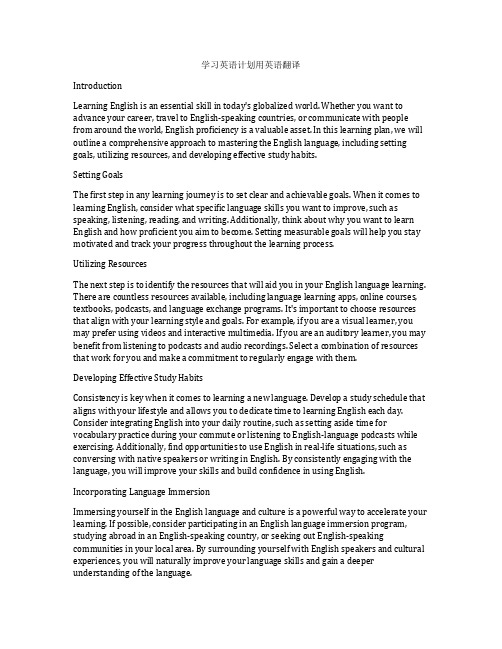
学习英语计划用英语翻译IntroductionLearning English is an essential skill in today's globalized world. Whether you want to advance your career, travel to English-speaking countries, or communicate with people from around the world, English proficiency is a valuable asset. In this learning plan, we will outline a comprehensive approach to mastering the English language, including setting goals, utilizing resources, and developing effective study habits.Setting GoalsThe first step in any learning journey is to set clear and achievable goals. When it comes to learning English, consider what specific language skills you want to improve, such as speaking, listening, reading, and writing. Additionally, think about why you want to learn English and how proficient you aim to become. Setting measurable goals will help you stay motivated and track your progress throughout the learning process.Utilizing ResourcesThe next step is to identify the resources that will aid you in your English language learning. There are countless resources available, including language learning apps, online courses, textbooks, podcasts, and language exchange programs. It's important to choose resources that align with your learning style and goals. For example, if you are a visual learner, you may prefer using videos and interactive multimedia. If you are an auditory learner, you may benefit from listening to podcasts and audio recordings. Select a combination of resources that work for you and make a commitment to regularly engage with them.Developing Effective Study HabitsConsistency is key when it comes to learning a new language. Develop a study schedule that aligns with your lifestyle and allows you to dedicate time to learning English each day. Consider integrating English into your daily routine, such as setting aside time for vocabulary practice during your commute or listening to English-language podcasts while exercising. Additionally, find opportunities to use English in real-life situations, such as conversing with native speakers or writing in English. By consistently engaging with the language, you will improve your skills and build confidence in using English.Incorporating Language ImmersionImmersing yourself in the English language and culture is a powerful way to accelerate your learning. If possible, consider participating in an English language immersion program, studying abroad in an English-speaking country, or seeking out English-speaking communities in your local area. By surrounding yourself with English speakers and cultural experiences, you will naturally improve your language skills and gain a deeper understanding of the language.Monitoring Progress and Adjusting GoalsRegularly assess your progress to determine if you are on track to achieving your language learning goals. Consider taking language proficiency tests, such as the TOEFL or IELTS, to gauge your proficiency and identify areas for improvement. If necessary, adjust your goals and study plan to address any weaknesses and continue advancing your skills.ConclusionLearning English requires dedication, perseverance, and a strategic approach. By setting clear goals, utilizing resources, developing effective study habits, incorporating language immersion, and monitoring progress, you can achieve proficiency in the English language. Remember that language learning is a dynamic and ongoing process, so embrace the journey and celebrate your growth along the way. With the right mindset and tools, you can confidently navigate the world in English and open doors to new opportunities.。
英文学习计划用英文翻译
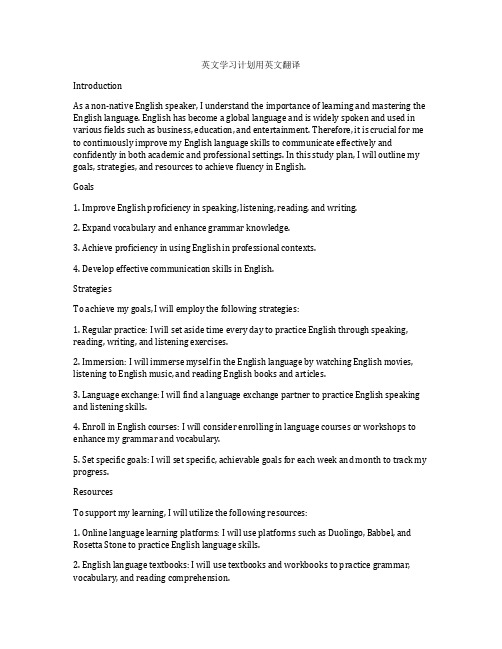
英文学习计划用英文翻译IntroductionAs a non-native English speaker, I understand the importance of learning and mastering the English language. English has become a global language and is widely spoken and used in various fields such as business, education, and entertainment. Therefore, it is crucial for me to continuously improve my English language skills to communicate effectively and confidently in both academic and professional settings. In this study plan, I will outline my goals, strategies, and resources to achieve fluency in English.Goals1. Improve English proficiency in speaking, listening, reading, and writing.2. Expand vocabulary and enhance grammar knowledge.3. Achieve proficiency in using English in professional contexts.4. Develop effective communication skills in English.StrategiesTo achieve my goals, I will employ the following strategies:1. Regular practice: I will set aside time every day to practice English through speaking, reading, writing, and listening exercises.2. Immersion: I will immerse myself in the English language by watching English movies, listening to English music, and reading English books and articles.3. Language exchange: I will find a language exchange partner to practice English speaking and listening skills.4. Enroll in English courses: I will consider enrolling in language courses or workshops to enhance my grammar and vocabulary.5. Set specific goals: I will set specific, achievable goals for each week and month to track my progress.ResourcesTo support my learning, I will utilize the following resources:1. Online language learning platforms: I will use platforms such as Duolingo, Babbel, and Rosetta Stone to practice English language skills.2. English language textbooks: I will use textbooks and workbooks to practice grammar, vocabulary, and reading comprehension.3. Language exchange websites: I will utilize websites such as Tandem and HelloTalk to find language exchange partners.4. Online English courses: I will explore online courses offered by educational institutions and language learning websites.5. English-speaking communities: I will join English-speaking communities and forums to engage in conversations and discussions in English.Study PlanMonth 1:1. Improve speaking and listening skills: I will practice speaking and listening through daily conversation exercises with a language exchange partner. I will also watch English movies with subtitles to improve my listening comprehension.2. Vocabulary building: I will focus on learning 20 new words every day and using them in sentences to reinforce my learning.3. Grammar practice: I will review basic grammar rules and practice using them in writing exercises.Month 2:1. Reading comprehension: I will read English books, articles, and news daily to improve my reading comprehension and vocabulary.2. Writing practice: I will write short essays and journal entries in English to improve my writing skills and grammar.3. Language exchange: I will continue practicing speaking and listening with a language exchange partner to enhance my conversational skills.Month 3:1. Enroll in English course: I will consider enrolling in an online English course to further improve my grammar, vocabulary, and overall language skills.2. Professional English: I will focus on learning English vocabulary and phrases used in professional contexts and practice using them in role-play scenarios.3. Review and practice: I will review all the skills I have learned and continue practicing speaking, listening, reading, and writing daily.Month 4:1. Fluency practice: I will focus on fluency by engaging in more complex and in-depth conversations with my language exchange partner and other English speakers.2. Confidence building: I will work on building my confidence in using English by actively engaging in conversations, presentations, and discussions in English.3. Continuous improvement: I will continue to practice and improve my English language skills by consistently using the language in various contexts.ConclusionBy following this study plan, I aim to improve my English language skills and achieve fluency in speaking, listening, reading, and writing. I understand that learning a new language takes time and dedication, but I am committed to putting in the effort to achieve my goals. I believe that through regular practice, immersion, and continuous learning, I will be able to communicate effectively and confidently in English.。
Plan for English Learning 英语学习计划

Plan for English Learning 英语学习计划(最新版)编制人:__________________审核人:__________________审批人:__________________编制学校:__________________编制时间:____年____月____日序言作文(composition)是经过人的思想考虑和语言组织,通过文字来表达一个主题意义的记叙方法。
作文分为小学作文,中学作文,大学作文(论文)。
作文体裁包括:记叙文、说明文、应用文、议论文。
作文并不神秘,要想写好一篇文章,首先要多看,多想,勤于观察,积累素材。
只有细致的观察生活,积累素材才是写好作文的基础。
首先要明确你要写的主题,认真的审题,列出大纲,不要只注意题目中要求的字有多少,要多注意题目的本身,要多读多想,准确的用好词语和修饰语。
这是审题的关键,要确立好主题的依据,要精心的选材,布局列题,有的材料,还要分析整理。
这就要对材料进行分类,比较,概括,筛选。
我们不要象盖房子那样的把所有的材料都堆砌起来,要合理恰当的组合,具体的说开头和结尾要略写,那么经过就要仔细的推敲,修辞,润色,写好以后不要急于交稿,反复检查认真的修改。
古人说:书读百遍,其义自见。
熟读唐诗三百首,不会作诗也会吟。
这些都说明一个道理,只要你多看书,多读书对你的写作文有一定的好处。
只要你明白这样的一个道理,作文就是要你把生活中喜,怒,哀,乐用文字经过加工,修饰。
整理,也就是我们说的作文。
作文内容I m a middle school student. I love English, but it s hard for me. Now I have a good plan to learn English.I have a pronunciation problem. I can t pronounce so well. So I plan to listen to the tape and read after it.I can t read English passages quickly and can t write a passage clearly. Now I plan to read more and practice writing often. As for listening, sometimes I can t understand what others are saying. So I plan to improve myself by listening to the radio and TV. Grammar is the most difficult for me. I have no idea of it, but I think my English teacher can help me with it.With this English-learning plan, I m hoping for great progress.我是一名中学生。
- 1、下载文档前请自行甄别文档内容的完整性,平台不提供额外的编辑、内容补充、找答案等附加服务。
- 2、"仅部分预览"的文档,不可在线预览部分如存在完整性等问题,可反馈申请退款(可完整预览的文档不适用该条件!)。
- 3、如文档侵犯您的权益,请联系客服反馈,我们会尽快为您处理(人工客服工作时间:9:00-18:30)。
英语学习计划用英语怎么说
英语学习计划就是按照自己的时间、精力等情况做出的适合自己的一个学习安排。
下面是关于的内容,欢迎阅读!
英语学习计划用英语怎么说
English study plan; plan for english study; Plan for English Learning;
例句:Wang to teach you the right brain learning English, and enhancement of spoken English, to their customized learning program to develop a good English.
[例句]自学英语,快速提高英语口语,给自己量身制定一个好的英语学习计划。
拓展:
学习计划的英文:
curricula
参考例句:
They elaborated a plan of study.
他们仔细制订了学习计划。
curricula是什么意思:
n. curriculum的复数
In many places, classrooms are overcrowded and curricula
are outdated.
许多地方的教室过于拥挤,课程已经过时。
Study on the Role, Admission and Curricula Design of Clinical Nurse Specialist
临床护理专家的角色职能、培养入选条件和课程设置的调查研究。
She seems quite clear about her future curricula.
她对自己未来要学的课程看来很有把握。
Most expect to make good money and burnish their curricula vitae.
大多数人为了更好的赚到钱而美化他们的简历。
Tourism Phenology is one option of the specific curricula of the Department of Tourism Management,College of Resources & Environment.
旅游物候课程是我院旅游管理专业一门具有校本特色的专业选修课。
英语学习计划的英语作文
The new term is coming, so I think I should make a school schedule for myself. In the morning, I will read English texts to improve my spoken English. In each class, I will listen to the teachers carefully and make notes. After school, I will come back home on time and do my homework at once. After supper, I
will go over what I learned in the day time and prepare for the tomorrow‘s classes. This is my school schedule.。
